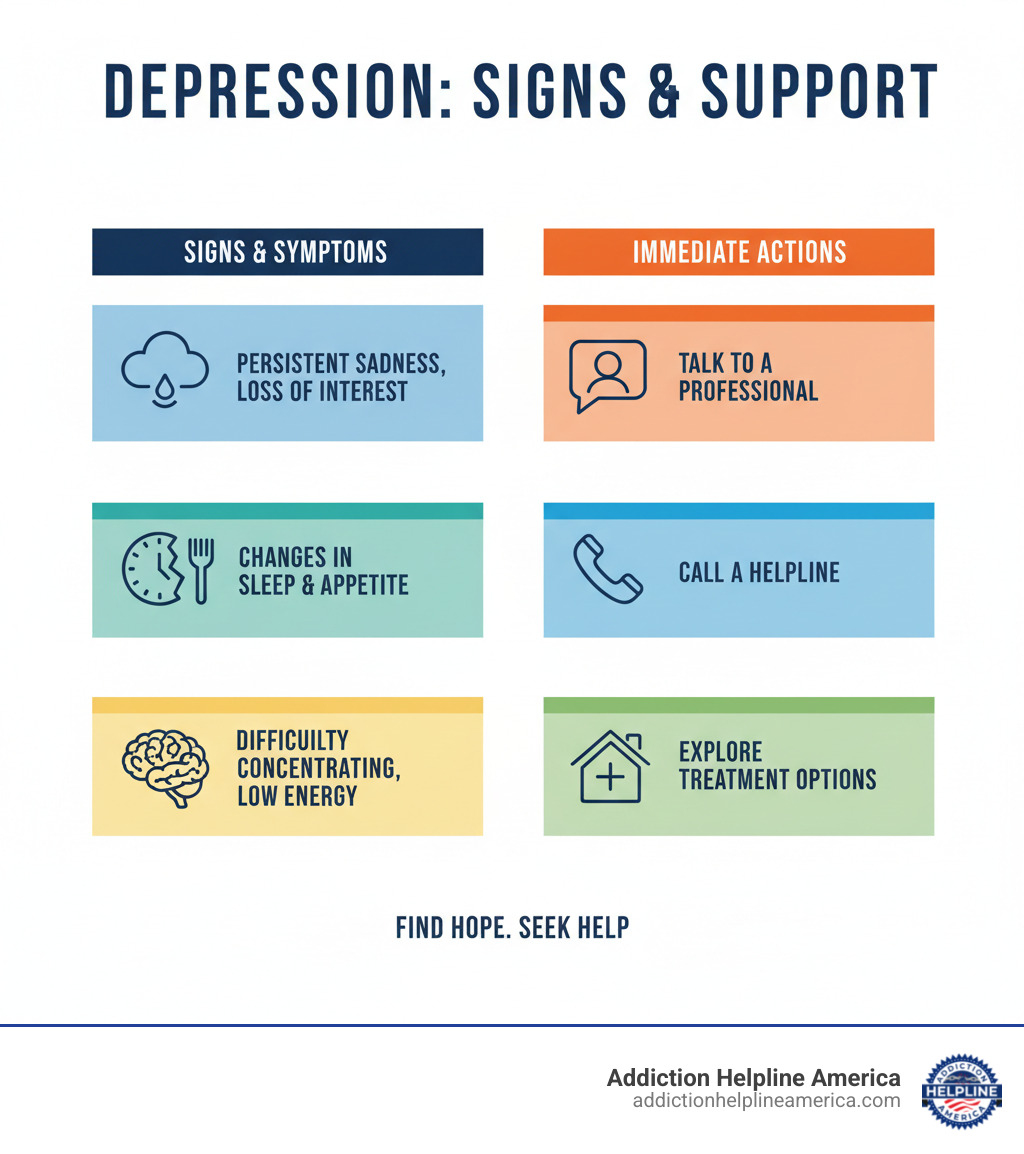
Finding Hope: Understanding Outpatient Depression Treatment Near You
If you’re searching for outpatient depression treatment centers near me, finding the right support can feel overwhelming. Depression is the leading cause of disability worldwide, but there is hope. Many effective options exist to help you or a loved one find relief.
To quickly find outpatient depression treatment centers nearby, consider these steps:
- Use online directories and helplines: Trusted online resources allow you to search by location, service type, and insurance.
- Contact local authorities: Your local Mental/Behavioral Health Authority can provide local resources.
- Call a helpline: Organizations like Addiction Helpline America offer free, confidential guidance and can connect you to suitable programs.
- Verify insurance: Contact your insurance provider to understand coverage for outpatient mental health services.
When you’re struggling with persistent sadness, a loss of interest in activities you once enjoyed, changes in sleep or appetite, or difficulty functioning, it might be time to explore treatment. Outpatient care offers a flexible way to get help while continuing to live at home and manage daily responsibilities.
At Addiction Helpline America, we understand the challenges of finding the right help, especially for sensitive topics like outpatient depression treatment centers near me. Our team of experienced professionals is dedicated to providing compassionate, confidential support, connecting individuals and families with vital resources and treatment options.
Outpatient depression treatment centers near me terms made easy:
Step 1: Understand Your Needs and Treatment Options
Taking the first step toward help is crucial. Let’s break down what outpatient depression treatment centers near me can offer and how they might fit into your life.
Outpatient treatment is professional care you receive while living at home, allowing you to continue with work, school, and family life. Unlike inpatient care, where you stay overnight, outpatient programs offer flexibility. This approach is often more cost-effective and allows you to practice new coping skills in your daily environment, supported by your community.
Differentiating Levels of Care: PHP vs. IOP
Outpatient programs vary in intensity. The two main types are Partial Hospitalization Programs (PHP) and Intensive Outpatient Programs (IOP). Both offer more support than weekly therapy but differ in time commitment.
Partial Hospitalization Programs (PHP), or “day treatment,” are the most intensive form of outpatient care. You’ll typically attend treatment five to six days a week for several hours, participating in various therapies before returning home at night. PHP is ideal if you need daily support but don’t require 24/7 supervision. A typical program lasts two to four weeks.
Intensive Outpatient Programs (IOP) are a step down in intensity. Treatment usually involves at least nine hours per week, spread over three to five days. This structure provides consistent support while allowing more time for daily responsibilities. IOPs focus on group therapy and skill-building, with programs often lasting eight to twelve weeks.
Here’s how they compare side by side:
| Feature | Partial Hospitalization Program (PHP) | Intensive Outpatient Program (IOP) |
|---|---|---|
| Hours/week | 20+ hours | 9-19 hours |
| Days/week | 5-6 days | 3-5 days |
| Typical duration | 2-4 weeks | 8-12 weeks (can vary) |
| Key services | Comprehensive therapy, holistic activities, medication management | Group/family therapy, medication management, skill development, recovery planning |
| Structure level | High | Moderate |
Who is a Good Candidate for Outpatient Treatment?
Outpatient treatment is effective, but it requires a safe and stable living environment. It’s best for those who are not in immediate crisis and can commit to attending scheduled sessions. If you are having thoughts of harming yourself or others, please seek immediate help by calling or texting 988 for the Suicide & Crisis Lifeline, or dialing 911 for an emergency. Many people transition to outpatient care after stabilizing in a higher level of care.
Motivation is also key. While you don’t need to feel 100% ready, a willingness to engage in the process is crucial for success. The journey begins with an initial assessment where a professional evaluates your needs to determine the appropriate level of care. This ensures you’re matched with a program that will truly help you get better.
At Addiction Helpline America, we help people steer these assessments every day. We can connect you with centers that specialize in what you’re facing, ensuring the right fit for your specific needs.
Step 2: Use Trusted Resources to Find Outpatient Depression Treatment Centers Near Me
When searching for help with depression, use sources you can trust. The internet has a lot of information, but not all of it is reliable. Connecting with genuine, high-quality care is our top priority for you.
Finding Reputable Care
Starting your search can feel overwhelming, but there are reliable ways to find help. Government health agencies and national non-profit advocacy groups offer valuable information and resources for mental health. These organizations are dedicated to public health and can provide a starting point for understanding your options.
However, navigating these resources and vetting individual centers can be time-consuming and confusing. That’s where a specialized helpline can make all the difference.
At Addiction Helpline America, we simplify the process. We offer free, confidential, and personalized guidance to connect you with the right recovery program from our vetted nationwide network. Instead of searching alone, let our caring professionals do the work for you. We understand the landscape of outpatient depression treatment centers near me and can quickly match you with options that fit your location, needs, and insurance.
You can find professional help for depression today by visiting our website or calling our helpline. We’re here to provide a clear path to recovery.
How do I use online locators to find outpatient depression treatment centers near me?
If you choose to use an online directory, it’s important to use filters effectively to narrow your search for outpatient depression treatment centers near me.
- Start with your location: Enter your city or zip code to find local options.
- Filter by service type: Be sure to select “Mental Health” and specify “Outpatient” care. You can often filter further for IOP or PHP.
- Filter by insurance and payment: To manage costs, filter by your insurance provider (e.g., Medicare, State Medical Assistance (Medicaid), private health insurance) or look for options like a sliding fee scale.
- Filter by special programs: Look for centers that cater to specific needs, such as veterans, young adults, or clients with co-occurring disorders.
Our research consistently shows how important it is to call before visiting. Always contact a facility to confirm they offer the services you need and have openings. Or, let Addiction Helpline America handle these calls for you.
Step 3: Verify Insurance and Plan for Treatment Costs
Financial stress shouldn’t prevent you from getting the help you need. Understanding your costs upfront can ease your mind and allow you to focus on recovery. While many people worry about the bill, you may have more options than you think.
Does Insurance Cover Outpatient Depression Treatment?
The good news is that most insurance plans do cover outpatient depression treatment. Due to mental health parity laws, insurers are required to cover mental health care similarly to physical health care.
- Medicare: Part B typically covers outpatient mental health services like therapy and psychiatric assessments. Part D helps cover prescription medications.
- Medicaid: Coverage for mental health services is available through Medicaid, though specifics vary by state. Check with your State Medical Assistance (Medicaid) office for details.
- Private Insurance: Your plan should cover therapy, medication management, and various levels of outpatient care.
To verify your benefits, call the number on your insurance card and ask:
- What are my outpatient mental health benefits?
- Do I need a referral?
- What are my deductible, co-pay, and co-insurance?
- Are there limits on therapy sessions?
- Which outpatient depression treatment centers near me are in-network?
What if I Don’t Have Insurance?
If you don’t have insurance, you still have options. Many treatment centers offer payment assistance programs or use a sliding scale fee based on your income. State-funded programs are another valuable resource; contact your Local Mental/Behavioral Health Authority to learn more. Don’t hesitate to ask facilities about center-specific payment plans. Most providers want to help and are willing to work with you.
At Addiction Helpline America, we can help you steer these financial questions and connect you with centers that offer the payment options you need.
Can I Use FMLA for Treatment?
Yes, depression qualifies as a serious health condition under the Family and Medical Leave Act (FMLA). This federal law can provide eligible employees with up to 12 weeks of unpaid, job-protected leave per year. This allows you to take time for treatment without worrying about losing your job. Talk to your HR department or look online for more information on FMLAs to understand your rights.
Step 4: Evaluate Program Quality and Services
Not all outpatient depression treatment centers near me are created equal. Once you have a list of potential centers, it’s crucial to evaluate their quality to ensure they are the right fit for your healing journey.
What to Look for in an Outpatient Treatment Center
When choosing a center, look for these signs of quality and professionalism:
- Accreditation: Look for accreditation from The Joint Commission or CARF, which signifies high standards for patient care and safety.
- State Licensing: Ensure the center is licensed to operate by the state.
- Staff Credentials: Inquire about the qualifications and licenses of the clinical staff.
- Evidence-Based Practices: A quality program will use scientifically proven therapies like Cognitive Behavioral Therapy (CBT) or Dialectical Behavior Therapy (DBT).
- Individualized Treatment Plans: The center should develop a personalized plan based on a thorough assessment of your specific needs and goals.
Core Services and Therapies Offered
A comprehensive program should offer a range of services to support your well-being:
- Psychiatric Assessment: An initial evaluation to diagnose your condition and determine if medication is appropriate.
- Individual Therapy: One-on-one sessions using evidence-based methods like CBT, DBT, or Interpersonal Therapy (IPT).
- Group Therapy: Sessions with peers to build community and reduce feelings of isolation.
- Medication Management: A psychiatrist prescribes and monitors medication to ensure its effectiveness.
- Holistic Therapies: Many centers integrate yoga, mindfulness, or art therapy to support overall wellness.
- Family Counseling: Education and therapy to help loved ones understand depression and learn how to support you.
Treatment for Co-Occurring Disorders
It’s common for depression to occur alongside other conditions like a substance use disorder or an anxiety disorder. This is known as a dual diagnosis or co-occurring disorders. A high-quality outpatient depression treatment center near me should offer an integrated approach that addresses all conditions simultaneously. Treating one issue without the other is often less effective. We believe in finding a treatment plan that addresses all your symptoms comprehensively.
Step 5: Prepare for Intake and Support a Loved One
Starting treatment can feel daunting, but preparing for the intake process can ease your worries. If you’re supporting a loved one, your role is invaluable.
Questions to Ask a Potential Provider
When you contact potential outpatient depression treatment centers near me, having a list of questions helps you make a confident decision. Here are key areas to cover:
- Program Structure: What does a typical day or week look like? What is the average length of the program?
- Therapeutic Approach: What therapies (e.g., CBT, DBT) do you use for depression? What is your approach to medication management, and are psychiatrists on staff?
- Staff and Support: What is the staff-to-patient ratio? How do you handle mental health crises?
- Family and Aftercare: What is your policy on family involvement? What aftercare and relapse prevention support do you offer?
- Logistics and Cost: What are the eligibility requirements? Do you have specialized programs for co-occurring disorders? What are the costs, what insurance do you accept, and are payment assistance options available?
These questions will help you get a clear picture of each program and find the best fit.
How to Support Someone Seeking Treatment
If you’re supporting someone looking into outpatient depression treatment centers near me, your care can make all the difference.
- Offer Emotional Support: Listen without judgment and validate their feelings.
- Help with Logistics: Offer to help with research, phone calls, or transportation to appointments.
- Participate When Possible: If the center offers family therapy or education, your involvement can be very helpful.
- Be Patient and Understanding: Recovery is a journey with ups and downs. Your steady presence is crucial.
- Encourage Self-Care: Gently remind them of healthy habits like good sleep, exercise, and a balanced diet, which can help manage depression.
- Know the Warning Signs: Be aware of persistent sadness, loss of interest, fatigue, or any talk of self-harm so you can encourage them to seek help sooner.
Your consistent, loving support is a powerful part of the healing process.
Frequently Asked Questions about Outpatient Depression Treatment
It’s natural to have questions when exploring treatment options. Here are answers to some common concerns.
How do I choose the best outpatient depression treatment center near me?
Choosing the “best” center is a personal decision. Look for key quality markers like accreditation, state licensing, qualified staff, and evidence-based therapies. Consider practical factors like location and convenience. Most importantly, ensure the program can treat your specific needs, such as co-occurring disorders, and trust your gut feeling during your initial conversations with the staff.
How long does outpatient depression treatment typically last?
The duration of treatment varies based on individual needs and the program’s intensity. Intensive Outpatient Programs (IOPs) often last 8 to 12 weeks, while more intensive Partial Hospitalization Programs (PHPs) are typically shorter, around two to four weeks. Treatment is not a race; the goal is sustainable well-being.
What happens after completing an outpatient program?
Finishing a program is a major step, but the journey continues. A good program will help you create an aftercare plan to maintain your progress. This often includes relapse prevention strategies, stepping down to less intensive care like weekly therapy, and connecting with support groups. Continued support is key to preventing future relapses and maintaining long-term wellness.
Find Hope and Healing Today
If you’ve made it this far, you’ve already taken an important step. You’ve spent time learning about what outpatient depression treatment centers near me can offer, how to find them, what to expect, and how to prepare. That shows courage and a commitment to change, and we want you to know that recovery from depression is not only possible—it’s happening every day for people just like you.
Depression can make everything feel heavy and hopeless, but the truth is that with the right support, people heal. They find joy again. They reconnect with loved ones. They refind parts of themselves they thought were lost forever. You deserve that same chance at healing, and it starts with reaching out.
Throughout this guide, we’ve walked through the practical steps: understanding different levels of care like PHP and IOP, using trusted resources to search for treatment, verifying your insurance coverage, evaluating program quality, and preparing for intake. These aren’t just administrative tasks—they’re stepping stones on your path to wellness.
At Addiction Helpline America, we’ve built our entire mission around helping people like you take that crucial first step. We offer free, confidential, personalized guidance because we believe no one should have to steer this journey alone or feel lost in a sea of confusing options. Our team understands that every person’s situation is unique, and we’re here to help you find the right recovery program from our vast nationwide network of trusted providers.
Whether you’re seeking help for yourself or supporting someone you love, we’re ready to listen without judgment and connect you with the care that fits your specific needs. You don’t need to have all the answers right now. You just need to be willing to take that next step.
Find professional help for depression today.
Depression may have brought you here, but hope and healing can take you forward. Let us help you find your way.
Our helpline is 100%
free & confidential
If you or someone you care about is struggling with drug or alcohol addiction, we can help you explore your recovery options. Don’t face this challenge alone—seek support from us.
Programs
Resources
Will my insurance
cover addiction
treatment?
We're ready to help
Find the best
drug or alcohol treatment
center
Are you or a loved one struggling with addiction? Call today to speak to a treatment expert.















